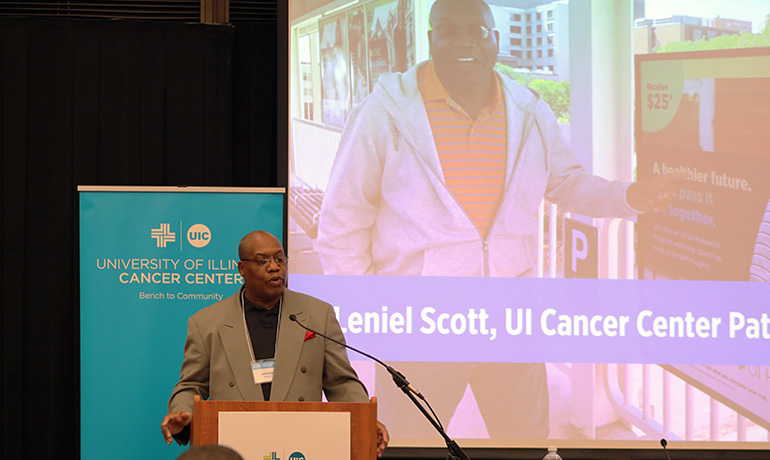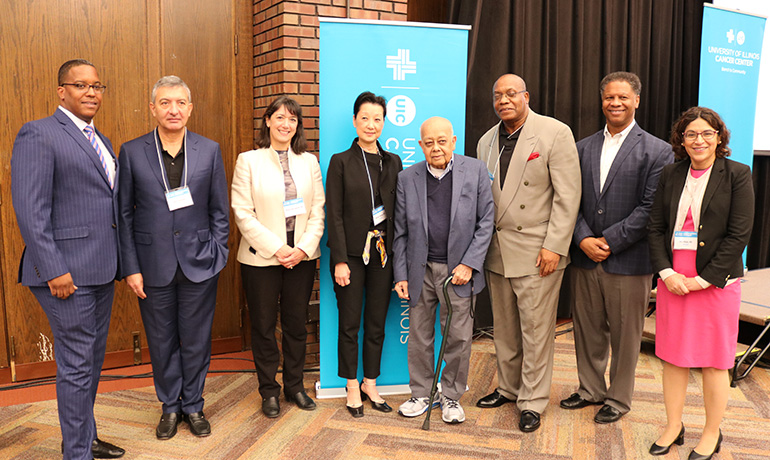
Dying had never entered Leniel Scott’s mind.
After being diagnosed with prostate cancer five years ago, Scott could only focus on one thing: living. A member of the University of Illinois Cancer Center’s Patient Brigade, Scott shared his story of survival at the Third Annual Dr. Tapas Das Gupta Symposium. Using numerous military references, Scott told the audience how he was ready to battle the enemy – prostate cancer – when his physician broke the news that he had contracted the disease that kills about 32,000 men annually.
“My doctor told me my PSA (prostate-specific antigen) was rising and falling and that I had an enemy invading my prostate,” said Scott, who spent 15 years as a job coach assisting people with vision loss gain permanent employment. “The enemy, he said, has set up a small camp in your territory, and we can bomb the enemy through radiation treatment. I told him I didn’t want to bomb the enemy, I want to get rid of it.”
Scott opted to undergo surgery, and today he is living cancer-free. He enjoys traveling with his wife and spending time with his grandchildren, and offers support to friends who are battling illnesses. “The University of Illinois (Health and Sciences System) was my Pentagon and Dr. (Michael) Abern was my general,” Scott said. “I want to thank everyone for my treatment, but I was never scared, because I knew I was going to live.” Abern is a urologic surgeon and member of the UI Cancer Center.
 Following Scott, three groundbreaking cancer investigators presented information on recent trends in research. Monica Bertagnolli, MD, FACP, FASCO, past president of the American Society of Clinical Oncology (ASCO) and Richard E. Wilson Professor of Surgery and Associate Surgeon at Brigham and Women’s Hospital and Dana Farber Cancer Center, discussed how to care and learn from each patient, and how to build a learning health care system.
Following Scott, three groundbreaking cancer investigators presented information on recent trends in research. Monica Bertagnolli, MD, FACP, FASCO, past president of the American Society of Clinical Oncology (ASCO) and Richard E. Wilson Professor of Surgery and Associate Surgeon at Brigham and Women’s Hospital and Dana Farber Cancer Center, discussed how to care and learn from each patient, and how to build a learning health care system.
“We need data about clinical research and also quality improvements,” Bertagnolli said. “Why is this so difficult today? How are we going to get the information? We need high quality computable data, and we need to share the data.”
Shelley Hwang, MD, MPH, presented her work on oncolytic poliovirus therapy for advanced triple negative breast cancer. Hwang is the Mary and Deryl Hart Professor of Surgery, Professor of Radiology, Vice Chair of Research for the Duke University Department of Surgery and co-leader of the Women’s Cancer Program at the Duke Cancer Institute.
Nita Ahuja, MD, MBA, FACS, William H. Carmalt Professor of Surgery, chair of surgery of Yale School of Medicine, and Surgeon-in-Chief, Yale New Haven Hospital, was the final presenter, who discussed epigenetic immune-priming as a treatment modality in solid tumors.
A question and answer session with the four presenters concluded the day.
Prior to introducing the panelists, Robert Winn, MD, UI Cancer Center director, thanked Das Gupta for his numerous contributions, not only to the center but to the medical profession.
“Dr. Das Gupta improved cancer care for all patients,” Winn said. “When I think of him and his family, I’m moved by the sacrifice that they went through for the University of Illinois Cancer Center. It’s an enormous task, being a cancer center director. He built this center from scratch. I personally want to thank him for all of his sacrifices.”
